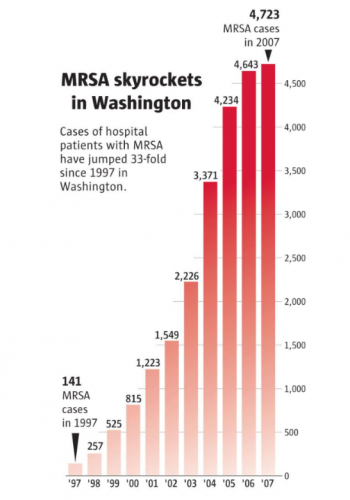This module supports grade 6 students’ science close reading, modeling, explanation, and argumentation practices while building students’ knowledge of evolution, microbes, and antibiotic resistance. The MRSA investigation materials include an interactive notebook with integrated routines, scaffolds, and tasks, and a set of texts presenting engaging news stories, data, and science principles. The accompanying lice pre/post assessment can be used to measure students’ close reading and modeling progress. The middle school MRSA investigation may be used with the Reading Models module and the Water investigation to provide more extensive opportunities to learn.
Explanatory Modeling in Science Through Text-Based Investigation: Testing the Efficacy of the Project READI Intervention Approach
This report describes the impact of Project READI science work on both teaching practices and student literacy learning. The Reading Apprenticeship team provided professional learning and text-based investigation modules for the intervention teachers and schools and conducted a multi-site efficacy trial in 9th grade biology. Teachers in the intervention group engaged in new teaching practices known to support students’ literacy and science learning, and differences between intervention and control teachers’ practices grew over the course of the study. Students who participated in the semester-long intervention of the READI approach outperformed those in business-as-usual classrooms in which the same science topics were covered, on both a project-developed assessment and on a scenario-based assessment developed by ETS.
Learn more about Project READI.
Building Academic Literacy: An Anthology for Reading Apprenticeship
Whether for use with Unit 1 of the Reading Apprenticeship Academic Literacy Course or on its own, this themed anthology for middle and high school students invites them to explore topics related to literacy and its relevance to their lives and their futures. Featuring lively and inspiring essays, journalism, poetry, expository writing, and personal narratives, the volume contains selections at varied levels of reading difficulty and offers diverse cultural and historical perspectives. This anthology appeals to disengaged readers whether they are struggling or advanced and can serve as an invaluable resource in any English language arts classroom, grades 6-12.
Building Academic Literacy
Lessons from Reading Apprenticeship Classrooms, Grades 6–12
Filled with instructional tips, lesson plans, and curricular resources, this book provides guidance for conducting Academic Literacy courses built around the Reading Apprenticeship framework. It also describes how to make use of readings from a companion student book, Building Academic Literacy: An Anthology for Reading Apprenticeship, and features case examples from five middle school and high school teachers who have successfully applied the Reading Apprenticeship instructional framework in diverse urban classrooms.
This book is a valuable resource for any subject-area teacher, grades 6-12, looking for classroom-based ideas to motivate adolescents in becoming more engaged, strategic, and competent readers.
Rethinking Preparation for Content Area Teaching
The Reading Apprenticeship Approach
Arguing that teacher education programs need to foster a broader understanding of adolescent literacy, especially if teachers are to help their students read in discipline-specific ways, the authors show how Reading Apprenticeship can strengthen content-based instruction, how elements of the model can be embedded in teacher preparation curricula, and what types of course activities enable new teachers to understand and practice this approach.
The Reading Apprenticeship framework has received national recognition as an effective, research-based instructional approach that supports all students in successfully engaging with and learning from academic texts. Emphasizing social, personal, cognitive, and knowledge-building tools, the Reading Apprenticeship approach can be useful to teachers in any content area classroom.
Traveling With Integrity: Translating Face‐to‐Face Teacher Professional Learning to Online and Blended Spaces
Read this article from the Journal of Adolescent Literacy to learn how it is both possible and important to stay true to the design principles of effective professional learning when teaching online.

